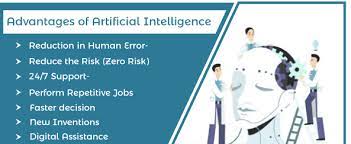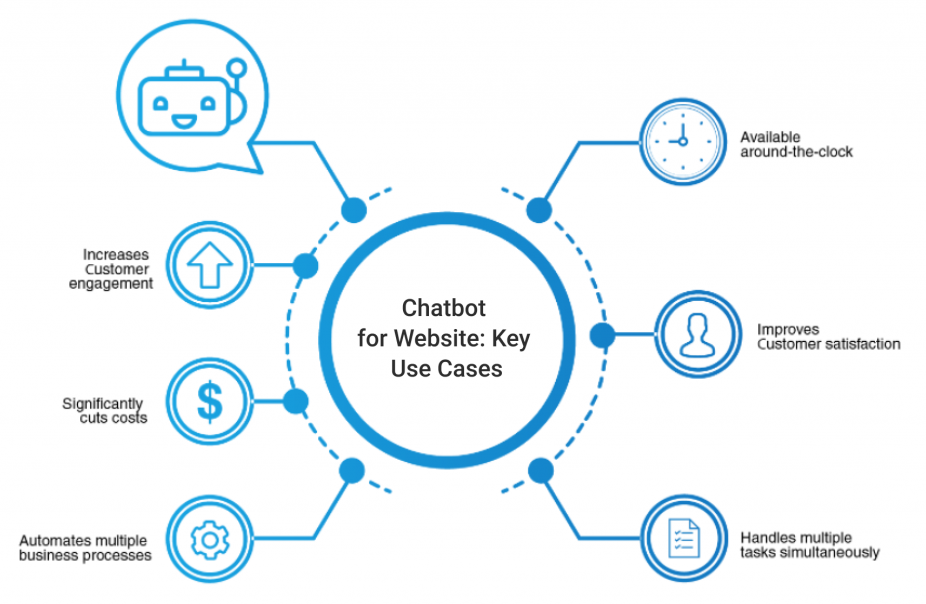
Advantages of AI
Advantages of AI: Revolutionizing Industries and Empowering Humanity
Artificial Intelligence (AI) has emerged as a transformative force, driving industries into new realms of innovation and redefining many advantages that how we live and work. With its ability to simulate human intelligence and perform complex tasks with remarkable efficiency, AI has become a catalyst for progress across various fields. From healthcare and finance to transportation and manufacturing, the advantages of AI are reshaping our world and empowering humanity to reach unprecedented heights. By augmenting human capabilities, enhancing decision-making processes, and unlocking vast amounts of data-driven insights, AI is revolutionizing how we solve problems and paving the way for a future of unparalleled possibilities.
AI Technology: Transforming the Way Businesses Operate and Succeed
In the ever-evolving landscape of technology, artificial intelligence (AI) has emerged as a game-changer, revolutionizing how businesses operate and succeed. With its ability to process vast amounts of data and make intelligent decisions, AI technology has become an indispensable tool for companies across various industries. Besides from automating repetitive tasks to enhancing customer experiences, AI can transform how businesses work, allowing them to streamline operations, improve efficiency, and gain a competitive edge in the market.
This transformative technology has opened up new avenues for innovation and growth, enabling businesses to harness the power of data-driven insights and predictive analytics. In this fast-paced digital era, where staying ahead of the curve is crucial, embracing AI technology has become necessary for businesses looking to thrive in the ever-advancing technological landscape. So, this short article will shed some light into the world of AI and explore how it is reshaping the future of business operations.
The Impact of AI on Businesses:
AI technology has made a significant impact on businesses, revolutionizing the way they operate and succeed. One of the key benefits of AI is its ability to automate repetitive tasks, freeing up valuable time for employees to focus on more strategic and creative endeavors. By automating routine processes, businesses can reduce human error, improve efficiency, and achieve cost savings. For example, AI-powered robots carry out complex and repetitive tasks in manufacturing industries precisely and accurately. This not only increases productivity but also ensures the safety of workers.
Furthermore, AI technology has transformed the way businesses interact with customers. With the advancement of natural language processing (NLP) and machine learning, AI-powered chatbots and virtual assistants have become increasingly sophisticated in understanding and responding to customer queries. These AI-driven customer service solutions provide businesses with round-the-clock support, improving customer satisfaction and reducing response times. Additionally, AI algorithms can analyze customer data to gain valuable insights into their preferences and behaviour, enabling businesses to personalize their offerings and deliver targeted marketing campaigns.
AI technology has also revolutionized data analysis and decision-making processes. With the ability to process vast amounts of data in real time, AI algorithms can quickly identify patterns, trends, and correlations that humans may overlook. This enables businesses to make data-driven decisions, optimize strategies, and gain a competitive advantage. For example, in the finance industry, AI-powered algorithms can analyze market data and predict trends, helping traders make informed investment decisions. Similarly, in healthcare, AI algorithms can analyze patient data and assist doctors in diagnosing diseases accurately and efficiently.
AI technology in different industries:
The impact of AI technology extends across various industries, transforming how businesses operate and succeed. In particular, in the healthcare industry, AI is revolutionizing patient care by improving accuracy in diagnosis, enhancing treatment planning, and enabling personalized medicine. AI algorithms can analyze medical records, images, and genetic data to identify patterns and provide insights that assist doctors in making informed decisions. Additionally, AI-powered robots can be used in surgical procedures, ensuring precision and reducing the risk of human error.
In the retail industry, AI technology is reshaping how businesses interact with customers. AI-powered recommendation engines analyze customer preferences, purchase history, and browsing behaviour to provide personalized product recommendations, enhancing the shopping experience and driving sales. Furthermore, AI-powered Chatbots are used to provide instant customer support, answer queries, and assist in purchasing.
AI technology has also made significant advancements in the financial industry. AI-powered algorithms can analyze vast amounts of financial data, identify patterns, and predict market trends, enabling traders to make informed investment decisions. Additionally, AI-driven chatbots are being used to enhance customer service by providing personalized financial advice and support.
AI-powered Automation and Efficiency:
AI-powered automation has become a game-changer for businesses, allowing them to streamline operations, improve efficiency, and reduce costs. By automating repetitive and mundane tasks, companies can free up human resources to focus on more strategic and creative endeavors. For example, in the manufacturing industry, AI-powered robots can carry out complex and repetitive tasks with precision and accuracy, increasing productivity and reducing the risk of human error.
Furthermore, AI-powered automation can enhance supply chain management by optimizing inventory levels, improving demand forecasting, and enabling efficient logistics. AI algorithms can analyze historical data, market trends, and customer behaviour to predict demand patterns accurately, ensuring businesses have the right products in the right place at the right time. Additionally, AI-powered robots can be used in warehouses to automate picking, packing, and shipping processes, reducing manual labour and increasing operational efficiency.
AI-powered automation extends to administrative tasks like data entry, document processing, and customer support. AI algorithms can analyze and process large volumes of data in real time, reducing the time and effort required for manual data entry. Additionally, AI-powered chatbots and virtual assistants can provide instant customer support, answering queries and resolving issues without human intervention.
AI for Customer Service and Support:
AI technology has revolutionized how businesses interact with customers, providing round-the-clock support and enhancing the customer experience. So, AI-powered chatbots and virtual assistants have become increasingly sophisticated in understanding and responding to customer queries, providing instant support and reducing response times. These AI-driven customer service solutions can handle various inquiries, from basic FAQs to complex issues, ensuring customers receive prompt and accurate assistance.

Benefits of Chatbot / Virtual Assistant
Furthermore, AI-powered chatbots can be integrated into various communication channels, such as websites, mobile apps, and social media platforms, providing a seamless and consistent customer experience across multiple touchpoints. This improves customer satisfaction and reduces the workload on customer support teams, allowing them to focus on more complex and high-value tasks.
AI technology lets businesses personalize customer interactions, enhancing the overall customer experience. By analyzing customer data, AI algorithms can identify patterns, preferences, and behaviour, allowing enterprises to deliver personalized recommendations, offers, and promotions. This level of personalization not only improves customer satisfaction but also drives customer loyalty and repeat business.
AI in data analysis and decision-making:
AI technology has transformed how businesses analyze data and make decisions, enabling them to gain valuable insights, optimize strategies, and stay ahead of the competition. Subsequently with the ability to process vast amounts of data in real time, AI algorithms can quickly identify patterns, trends, and correlations that humans may overlook. This allows businesses to make data-driven decisions based on accurate and up-to-date information.
In data analysis, AI technology has been instrumental in solving complex problems and extracting meaningful insights from large datasets. For example, in the healthcare industry, AI algorithms can analyze patient data, medical records, and genetic information to identify patterns and predict disease outcomes. This enables doctors to diagnose accurately, develop personalized treatment plans, and improve patient outcomes.
In addition to data analysis, AI technology plays a crucial role in decision-making processes. AI algorithms can analyze market data, customer behaviour, and historical trends to predict future outcomes and optimize strategies. This enables businesses to make informed decisions, allocate resources effectively, and mitigate risks. For example, in the retail industry, AI algorithms can analyze sales data, market trends, and customer preferences to optimize pricing strategies, inventory management, and marketing campaigns.
AI and personalization in marketing:
AI technology has revolutionized marketing, enabling businesses to deliver personalized and targeted campaigns that resonate with their customers. Thus by analyzing customer data, AI algorithms can identify patterns, preferences, and behaviour, enabling businesses to deliver personalized recommendations, offers, and promotions. This level of personalization not only improves customer satisfaction but also drives customer loyalty and repeat business.
AI-powered recommendation engines have become increasingly sophisticated in understanding customer preferences and delivering relevant content. Thus by analyzing customer purchase history, browsing behaviour, and demographic information, AI algorithms can generate personalized product recommendations tailored to individual customers’ interests and needs. This enhances the customer experience and increases the likelihood of conversion and upselling.
Furthermore, AI technology enables businesses to optimize their marketing campaigns by analyzing and predicting customer behaviour. AI algorithms can analyze historical data, market trends, and customer preferences to identify the most effective marketing channels, messages, and timing. Subsequently, this allows businesses to allocate their marketing budgets more effectively, maximize return on investment, and achieve higher conversion rates.
Challenges and ethical considerations of AI:
While AI technology offers numerous benefits to businesses, it also presents specific challenges and ethical considerations that must be addressed. One of the main challenges is the potential impact on the workforce. As AI-powered automation becomes more prevalent, there is a concern that it may lead to job displacement and unemployment. However, it is crucial to note that while AI may automate specific tasks, it also creates new job opportunities in areas such as AI development, data analysis, and AI-driven strategy.
Another challenge is the potential bias in AI algorithms. AI algorithms are trained on historical data, which may contain biases and discrimination. AI systems may perpetuate and amplify existing social inequalities if these biases are not addressed. Businesses must ensure that AI algorithms are fair, transparent, and unbiased by regularly auditing and monitoring their performance.
Moreover, there are ethical considerations surrounding the use of AI, particularly in areas such as privacy and security. AI systems often require access to large amounts of data, raising concerns about data privacy and the potential misuse of personal information. Businesses must ensure robust data protection policies and comply with relevant regulations to safeguard customer data.
Implementing AI in your business:
Implementing AI technology in your business requires careful planning and consideration. So, here are some critical steps to guide you through the process:
- Identify your business goals and objectives: Determine how AI can help you achieve your business goals and address specific challenges or pain points.
- Assess your data readiness: Evaluate the quality, quantity, and accessibility of your data. AI algorithms require high-quality data to deliver accurate and reliable results.
- Choose the right AI solution: Research and evaluate different AI solutions based on your needs and requirements. Consider factors such as scalability, ease of integration, and vendor reputation.
- Develop a proof of concept: Start with a small-scale pilot project to test the effectiveness of the AI solution and demonstrate its value to critical stakeholders.
- Train and fine-tune the AI algorithms: AI algorithms require training on relevant data to deliver accurate results. Continuously monitor and fine-tune the algorithms to ensure optimal performance.
- Ensure ethical and responsible AI use: Establish guidelines and protocols to ensure that AI systems are fair, transparent, and unbiased. Regularly audit and monitor AI systems to identify and address any potential biases or ethical concerns.
- Provide employee training and support: Educate and train employees on using AI systems effectively and leveraging their capabilities. Provide ongoing support and encourage feedback to ensure a smooth transition.
Future trends in AI technology:
As AI technology continues to advance, several trends are expected to shape the future of business operations:
- Increased adoption of AI-powered automation: Businesses will increasingly rely on AI-powered automation to streamline operations, improve efficiency, and reduce costs. AI-powered robots and software solutions will become more sophisticated and capable of handling complex tasks.
- Advancements in natural language processing (NLP): NLP technology will continue to evolve, enabling AI-powered chatbots and virtual assistants to understand and respond to human language more accurately and naturally. This will enhance the customer service experience and enable more seamless interactions.
- Enhanced predictive analytics: AI algorithms will become more accurate and reliable in predicting future outcomes based on historical data and trends. This will enable businesses to make more informed decisions, optimize strategies, and mitigate risks.
- Continued growth in personalized marketing: AI-powered recommendation engines will become more sophisticated in analyzing customer data and delivering personalized content and offers. This will enable businesses to deliver targeted marketing campaigns that resonate with individual customers.
- Ethical and responsible AI use: As AI technology becomes more prevalent, there will be an increased focus on ensuring ethical and responsible AI use. Businesses must establish guidelines and protocols to address biases, protect data privacy, and comply with relevant regulations.
Conclusion:
AI technology has emerged as a transformative force, revolutionizing businesses’ operations and success. From automating repetitive tasks to enhancing customer experiences, AI has the potential to streamline operations, improve efficiency, and gain a competitive edge. So, by harnessing the power of data-driven insights and predictive analytics, businesses can make informed decisions, optimize strategies, and deliver personalized experiences. However, companies must address AI’s challenges and ethical considerations to ensure fair and responsible use. As AI technology evolves, businesses must stay ahead of the curve and embrace this transformative technology to thrive in the fast-paced digital era.
